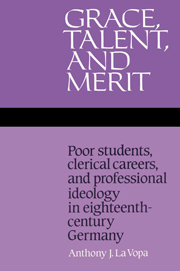 Grace, Talent, and Merit
Grace, Talent, and Merit Book contents
- Frontmatter
- Contents
- Acknowledgments
- Introduction
- PART I POOR STUDENTS
- PART II CALLING, VOCATION, AND SERVICE
- 5 The calling: August Hermann Francke and Halle Pietism
- 6 Vocation: the natural self and the ethic of reason
- 7 Meritocracy: language and ideology
- 8 The egalitarian alternative: theory and practice
- PART III NEW DEPARTURES
- Epilogue
- Bibliographical note
- Index
8 - The egalitarian alternative: theory and practice
Published online by Cambridge University Press: 26 March 2010
- Frontmatter
- Contents
- Acknowledgments
- Introduction
- PART I POOR STUDENTS
- PART II CALLING, VOCATION, AND SERVICE
- 5 The calling: August Hermann Francke and Halle Pietism
- 6 Vocation: the natural self and the ethic of reason
- 7 Meritocracy: language and ideology
- 8 The egalitarian alternative: theory and practice
- PART III NEW DEPARTURES
- Epilogue
- Bibliographical note
- Index
Summary
THE NEW BREED
“We would in a short time see entirely different men around us,” Immanuel Kant observed in an advertisement for Basedow's Philanthropinum in 1777, “if once that educational method were in full swing that is derived wisely from nature itself, and not slavishly copied after the old custom of rude and inexperienced ages.” What was needed, Kant argued, was not “gradual improvement” in the conventional schools, but the “quick revolution” that only an experimental school like Basedow's could accomplish. But from a social standpoint, the agenda for a pedagogical “revolution” bypassed the experimental schools of the late eighteenth century; in the emergence of an egalitarian rationale for meritocracy, they were largely irrelevant. They might be designed to counteract the arrogance of lineage and great wealth, but they were too dependent on the financial support of affluent and educated parents to question in more fundamental terms the neocorporate equation of inherited advantages with “merit.”
That questioning arose at the two extremes – the domestic setting of private tutoring and the public setting of town schools – that experimental institutions were designed to avoid. In the last decades of the century, many wealthier families still preferred tutoring to the Latin schools, and particularly to their lower grades. The widespread reliance on this institution gave poor students firsthand experience not only of the “public” style of the aristocratic household, but also of bourgeois domesticity in its more affluent forms. In the second half of the century it was still common for experience as a tutor to complete a young man's relatively unproblematic induction into polite society.
- Type
- Chapter
- Information
- Grace, Talent, and MeritPoor Students, Clerical Careers, and Professional Ideology in Eighteenth-Century Germany, pp. 216 - 246Publisher: Cambridge University PressPrint publication year: 1988


